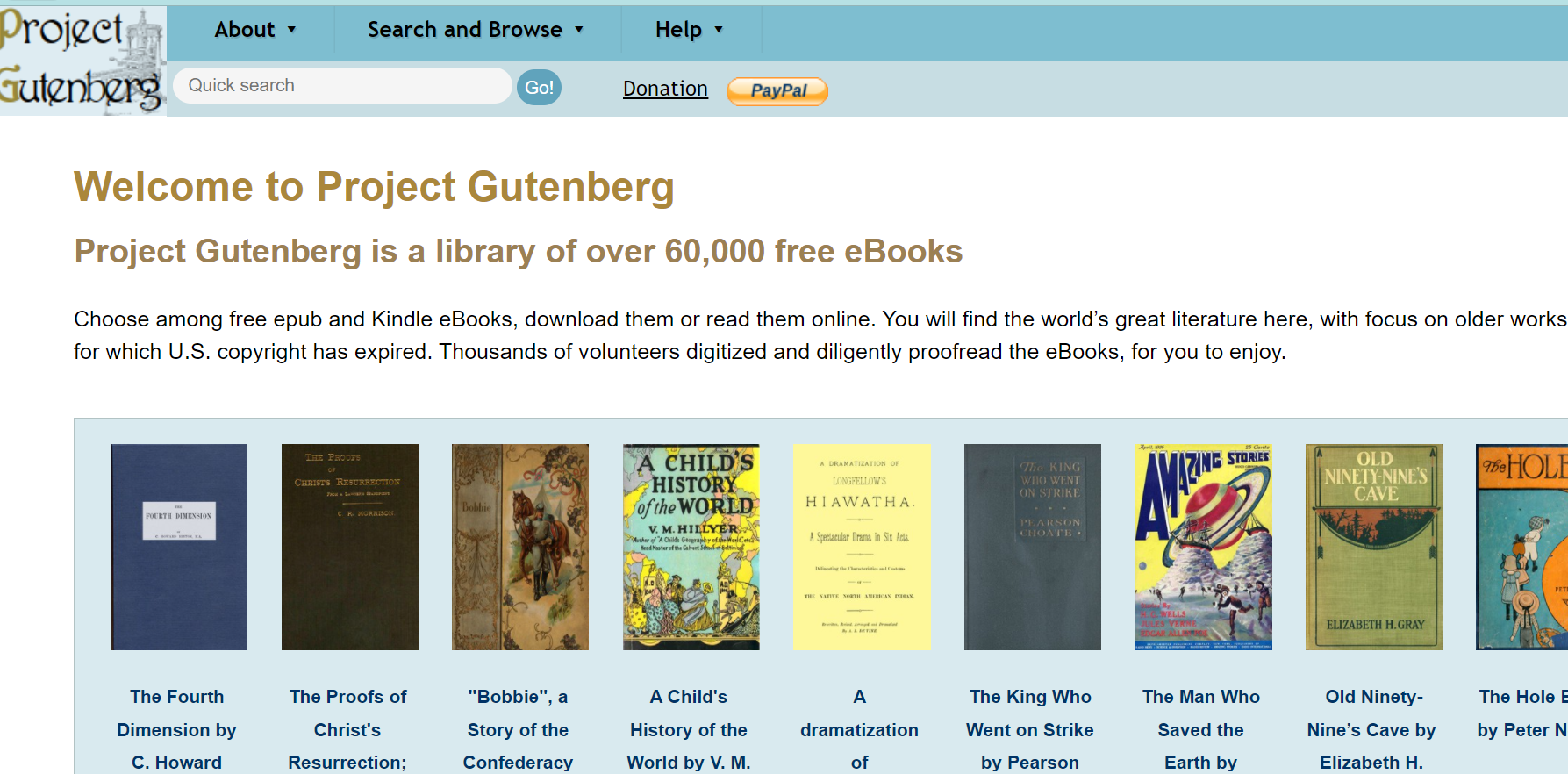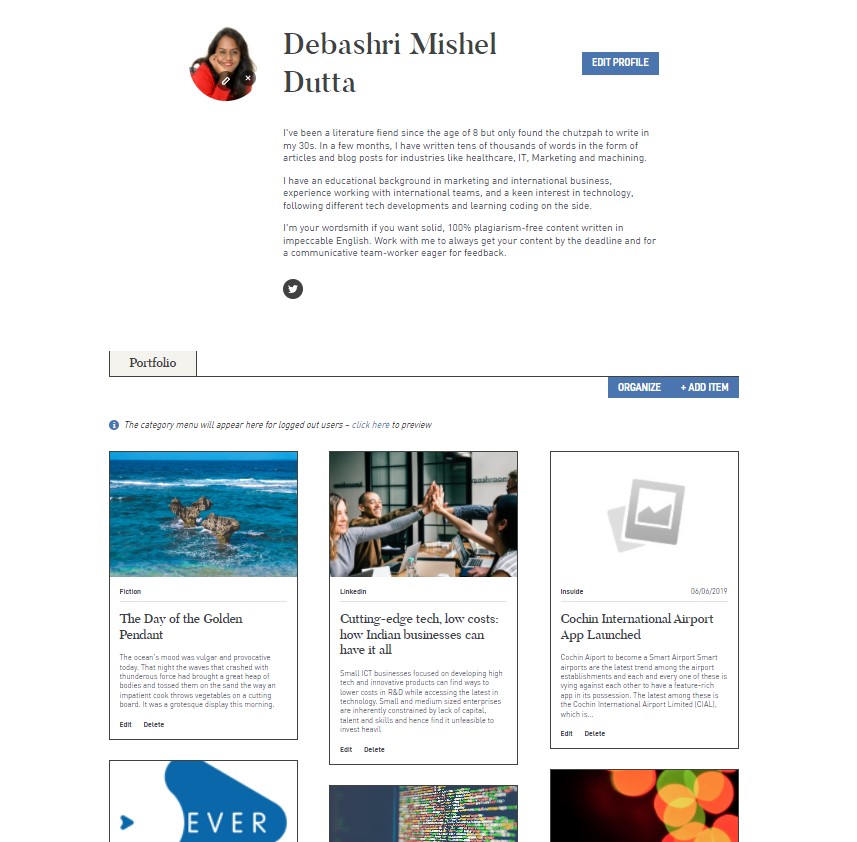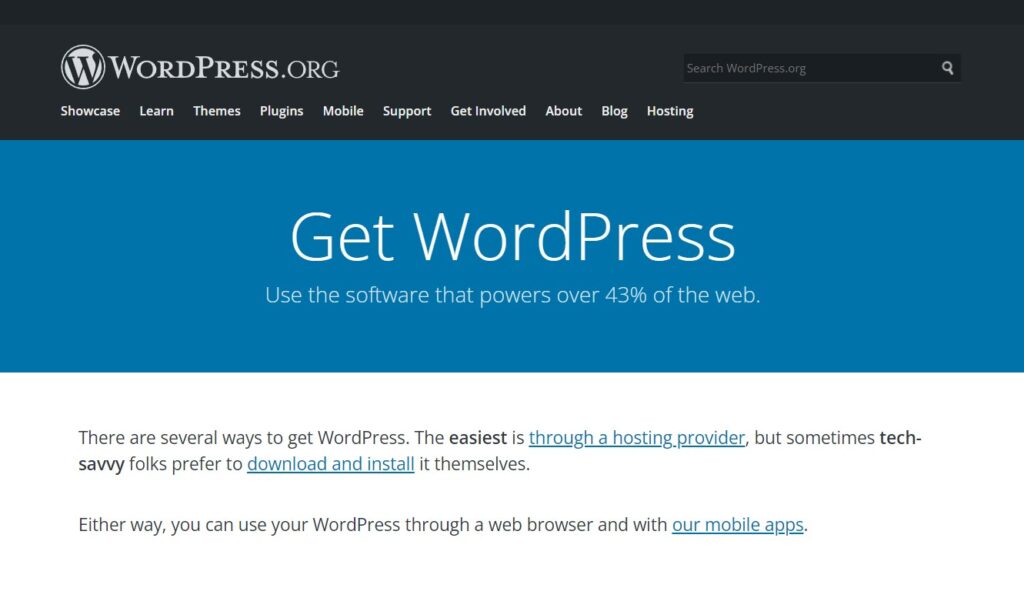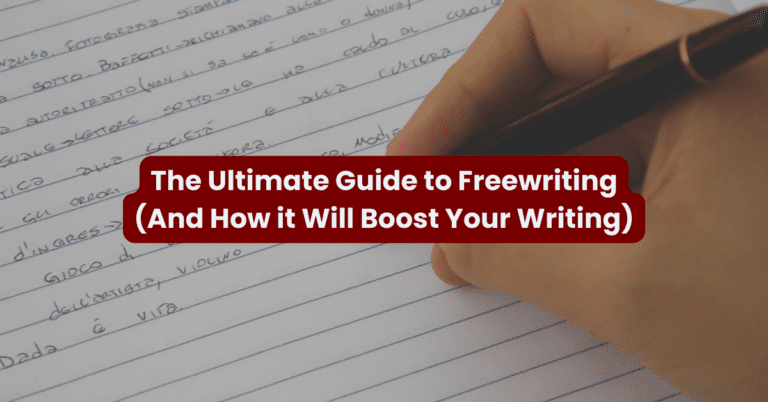Content writing is one of the most sought-after jobs for anyone who wants to work remotely.
And for good reason too.
After all, if you know English (or the language that’s relevant to you) then you can write. Content writing has a low barrier to entry and it can be rewarding – both financially and personally.
Are you interested in being a content writer? If you are, then this post will help you out.
I’m going to share the top mistakes new content writers make when they’re starting out. As someone who’s working as a content marketer and has hired other writers, I’ve made and seen mistakes that affect how quickly you get work.
Keep reading to learn about the mistakes you should avoid as a new content writer.
- 1. Not reading
- 2. Not having a portfolio
- 3. Not learning SEO
- 4. Not knowing basic HTML and CSS
- 5. Not knowing WordPress
- 6. Not following instructions
- 7. Not having good grammar
- 8. Not using freewriting to overcome blocks
- 9. Not writing in a conversational manner
- 10. Not formatting your articles
- Overcome writing mistakes to become a content marketer
1. Not reading
No one can be a great or even a good writer unless they read a lot too. It simply isn’t enough to know a language by speaking it or studying it in a very general way at school. You need to absorb what good content sounds, looks, and feels like by reading a large number of books.
I recommend reading books from a range of genres. Reading classical literature will help you with grammar and show you what beautiful language sounds like. And reading history, biographies, business stories, and anything else adds to your store of knowledge. The more you know, the more you have to write about.


When you’re well-read, you have something different and useful to say. I’ve hired and compared writers enough to know when someone is an avid learner. Their content has examples, meaningful points, and interesting approaches to the topic. But writers who don’t read often come up with generic points that fail to catch one’s attention.
Another reason why you should read a lot is that you need the ability to do research. Whether you work as a freelancer or for a company, expect to receive topics that are unfamiliar to you. If you’re already a practiced reader, you’ll be able to read, understand, and reproduce content from what you’ve read.
Reading tips:
- Read content from high-quality publications like The Wall Street Journal, National Geographic, and other major houses. Their high standards mean that you’ll expose yourself to good writing practices
- Get into the habit of reading full books. When you find a book that holds your attention, you can identify why the book works and how you can apply it to your writing
- I also suggest listening to audiobooks. While this won’t help you absorb grammar and good writing practices in a natural way, you will learn so many interesting facts that will make your own writing come alive
- Want more specific subjects to read about? Try books about: money, psychology, habit-building, business stories, and marketing. Content writers need to know about influencing people and marketing to write compelling material.
2. Not having a portfolio
I once tried to hire a writer using Facebook’s Jobs feature. When I asked one of the candidates for a sample of their work, they proceeded to write and share a post right in the chat messenger.
I don’t mean that they shared a document file with me through chat. I mean that they used the chat platform itself to send paragraphs of text to act as a sample. Wow.
While no other candidate did this, a surprising number of people did not have any sample posts to share. Some people sent me articles that were clearly written very quickly. While others stopped showing an interest in doing the work.
It should be obvious, but it doesn’t seem to be – you should have a portfolio of your work ready to share.
What is a content writing portfolio?
A portfolio is just a set of articles and other content you’ve created. They represent your best work and what you can do for clients. It’s best if you have a few posts that are live on websites that don’t belong to you. That is, they’ve been accepted by online publications. The fact that your content is live on a good website can say a lot about your skills.
Here are a few ideas on ways you can create a content writing portfolio:
- Participate in writing contests. If your entry wins or gets featured, it’ll work as a great example of how good a writer you are.
- Submit your posts to places like Medium and Vocal.media. They accept and publish content from the public and they are very popular platforms
- Create a WordPress.com or Blogspot blog. These are free blogging platforms where anyone can post content
- Post articles on LinkedIn. LinkedIn has an article feature that’s a lot like a blog platform. You can share your thoughts there and they’ll be visible to the public
- Do freelance work for free or for cheap for businesses. Have your content appear on their site and ask that you can take credit for them (please note that I don’t recommend working for free or for cheap in general. Except when you can leverage such work to grow yourself)
- Use clippings.me – a free platform for writers who want to feature their content in a gorgeous portfolio format.


If you haven’t made a portfolio already, then sign up with clippings.me right away. You get a link that you can share with anyone and they’ll be able to view your profile easily.
In short, be active and keep building a body of work. Don’t make the mistake of not having any proof of your abilities when an employer or client shows interest in you.
3. Not learning SEO
Content writing and Search Engine Optimization (SEO) are closely tied together. For many clients, the whole point of creating content is to rank for specific keywords. When their blog content and website appear as a top search result, they’ll get more website visitors whom they can convert to buyers.
You need to build basic SEO skills by learning about it online. There are plenty of free resources where you can pick up the basics. SEO platforms like Moz, Ahrefs, and SEMrush create awesome articles that you should read. You can also follow Neil Patel or look up videos on YouTube to learn SEO for content writing.
Content writing today involves adding the right keywords, structuring your posts well, creating hyperlinks, and more. As a content writer, you’ll be expected to know these things so that you can optimize your posts to rank well online.
Make sure that you build your SEO skills and add them to your profile on LinkedIn and everywhere else. Don’t make the mistake of disappearing into a sea of writers by missing out on this critical skill.
Where to learn SEO
- Head to Udemy to find cheap and good courses on SEO. Wait for a sale to get the best price on virtually any subject you want to learn
- Hubspot also offers free SEO training. It’s a major name in the digital marketing field and you’ll be learning powerful tips from the best
- Ahrefs is a powerful SEO tool that also provides free SEO training. One of the things you will learn is that you’ll need a good SEO tool to help you find information and apply it
- Also, make sure that you follow Neil Patel as he shares a ton of helpful and detailed tips to grow businesses with digital marketing
You don’t need to become an SEO expert to be a highly paid content writer. But you do need to know enough to understand how to write good content that’s internet optimized. Knowing about linking, formatting your post for the web, and other information is critical if you be taken seriously as a content writer.
4. Not knowing basic HTML and CSS
Although modern publishing platforms like WordPress have changed enough to make knowing HTML and CSS unnecessary, it’s still helpful to know them.
It isn’t mandatory to be knowledgeable in these two coding languages. But being familiar with them only serves you. Trust me, when your resume or LinkedIn profile says that you know basic HTML and CSS, your value only goes up.
Even though I rarely have to use them at work, sometimes I come across publications that insist on writing content the old-fashioned way. They want you to use HTML tags and CSS styling to publish your work – and knowing how to use tags to format your posts makes things easier for you.
And sometimes, formatting options on modern editors don’t work or they make mistakes. Knowing your HTML tags and CSS will help you structure your work exactly as you need. And you can make minor cosmetic changes to a website on your own.
HTML and CSS are easy languages. They can feel difficult at first for someone who’s never used code before. But with a few tries, you’ll get the hang of it. At least, enough to save you when you’re in trouble.
How to learn HTML and CSS
- I began to enjoy learning HTML thanks to Codeacademy. They have a user-friendly setup that will make it easy to pick up basic coding
- Read kids’ books and use kids’ apps to learn to code. Why not! They’re meant to be easy to absorb. If kids can learn to code from books and apps, so can you
- Use W3School to find every detail about HTML and CSS that you might need
Remember, you don’t need to be an expert in HTML and CSS. Knowing enough to troubleshoot problems you might come across is more than enough.
5. Not knowing WordPress
If you plan to work as a content writer, then chances are that you’ll have to work with WordPress at some point. WordPress is a Content Management System (CMS), aka a website-building platform that makes it easy for anyone to set up their own blog.
As a writer, expect to have to log in to the backend of a website using WordPress’s admin link. You’ll have to know how to add a post, how to edit one, how to add images, and more.
And by the way, I mean learning how to use the WordPress software that you can download for free from WordPress’s dot org site. I am not talking about creating a blog using WordPress dot com or wordpress.com.
These are very two different versions of WordPress and the first one is for building websites that end with a .com or a .org. And the second one is for sites that are free and ends with a .wordpress.com. Meaning, yourname.wordpress.com.
My best advice for learning WordPress is to use Udemy or some other paid online platform for a structured learning experience. Knowing WordPress is a skill that will make you stand out from other writers.
You want to learn how to download and use this –


And not this –


You can read my comparisons of the best blogger platforms to learn what’s best for you.
6. Not following instructions
When you’re applying for work or writing a freelance article, make sure you follow the instructions you’ve given. Exactly.
It’s a strange fact but there are many writers who ignore the details of the job they’re doing.
For example, not sticking to the word count, not using the keywords given, or not meeting the deadline. Even if you feel like you know better, you should always follow the guidelines you’ve been given strictly. Ask for more information if you feel like the guidelines are wrong but follow them otherwise.
When you fail to notice the small details and follow them, clients won’t hire you again. In fact, many recruitment processes include tasks or questions that test how attentive to detail you are.
Do what you’re asked and don’t miss any of the requirements clients or employers give you. If you’re really concerned about something, ask.
7. Not having good grammar
While there’s a lot of leeway for how you use grammar when you speak, you can’t apply the same looseness to writing.
Many writers don’t get jobs or get negative feedback simply because they have poor grammar and don’t realize it. It’s critical to read books often if you want to spot where your own grammar is going wrong.
‘Should of’ is not right. And you need to know when to use ‘they’re’, ‘their’, and ‘there’. As well as ‘it’s’ and ‘its’.
Read a few books on grammar for writing or do some online courses even you’re a native English speaker. Fortunately, it’s easy to improve your writing as long as you’re willing to put in the work. And I reiterate that reading literature and good books will help you a great deal by giving you context for grammatical rules.
If you want to work as a content writer, then don’t make the mistake of ignoring your grammatical mistakes.
Also, use free tools to check your Grammar as you write. A popular tool to check out is Grammarly. The free version will catch all the basic mistakes. But the premium features will point out things like repetitive statements and other issues.
8. Not using freewriting to overcome blocks
Most writers face mental blocks to writing that keep them from completing their work on it. This happens to everybody. But you can easily overcome this by learning to freewrite.
Freewriting is when you start typing or writing continuously for a fixed period of time – say, 10 minutes. You don’t pause to think, correct mistakes, or do any other task. All you do is write from the moment your timer goes off to the moment it stops. And you go on to edit your work once you’re done with a burst of energetic writing.
I personally vouch for the effectiveness of freewriting. It saved me from going insane and giving up when I joined my amazing company and felt overwhelmed.
However, there are many writers who dislike freewriting as a tool. If you look around for writing advice, people suggest making an outline that details what your post will consist of. You then thoughtfully draft your article and make it sound good from the very start.
Freewriting works the opposite way. You simply keep a topic in mind but what you do next is to write away without any thought to structure. This technique works well for people who get overwhelmed by having to pick out details and worry about each sentence as they write them.
Just write away at first. And worry about editing later.
9. Not writing in a conversational manner
There are many aspiring writers who have strong academic backgrounds and think that they need to bring their experience to writing for the internet. Not so.
Writing in a formal and academic way (for marketing) will kill any interest customers will have in your copy. And as a result, the business you write for will suffer when people bounce from its web pages.
When writing, pick phrases and words that you might use with a close friend (appropriate ones, please).
Talk to your audience directly. Say ‘you’ in your content. Use friendly language that anyone can understand. Business owners and content managers are not looking for people who write in a convoluted way or use jargon. Such approaches won’t make you or your content sound clever.
It takes real skill to express difficult concepts in an easy way that’s also SEO friendly. Use a tool like the Hemingway App to check if you can simplify your writing. After using the app a dozen times to correct your work, you’ll find it easier to create simple and readable content on your own.
10. Not formatting your articles
I remember when I was a ‘kid’ and applied a cursive font to a post I made. I thought it was cute and impressive but failed to recognize that no one would take time out to decipher what I wrote.
I felt so disappointed when I learned that it’s best to stick to common fonts like Arial or Helvetica. It felt like I was being stripped of the opportunity to be creative. But when you’re writing, you’re doing it to help people – your readers and your clients.
So, remember that you need to format your articles so that they’re easy to read in a flash. Here are some tips:
- Use bullet points to replace paragraphs whenever it makes sense
- Create subheadings so readers know what each section of your post is about
- Don’t overuse the Bold and Italics formatting
- Break up your paragraphs so that each one has only 3-4 lines each
- Add images to your post so that it creates a break and adds context
Making a few changes like these goes a long way to improving how your content looks. Remember, people scan articles first and decide if it’s for them. Structure your posts to make it easier for your readers to understand your content fast.
If your blog post or article looks like a page from a historical treatise or a boring textbook, then you’re doing something wrong. Break up your post into bite-sized sections to create the best impact.
Overcome writing mistakes to become a content marketer
I’ve covered some of the biggest mistakes content writers make when they’re trying to break into the field. If you start by avoiding the major mistakes I’ve laid out here, then you’ll enter the content writing field strong.
Of course, there are several more like not marketing yourself or procrastinating. What are some blocks to becoming a content writer that you’ve experienced? What have I missed?
Let me know!







